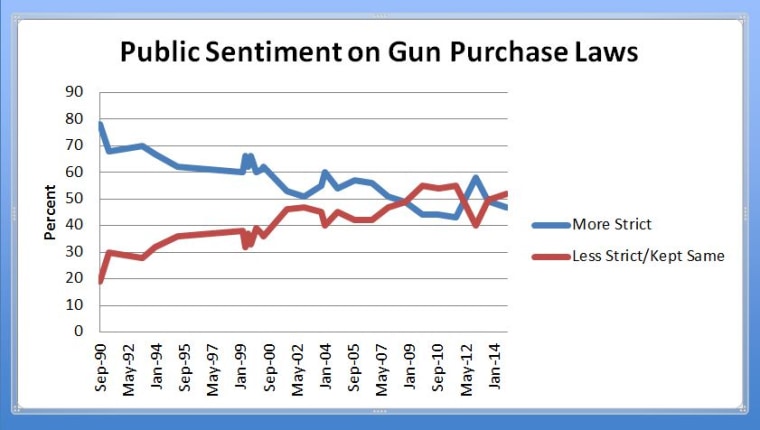Another mass shooting, this week in Oregon, brings another set of questions from gun control advocates about why legislation tightening or restricting access to firearms has not moved through Congress. After the Thursday shooting President Barack Obama urged Congress to take action, as he has after previous shootings.
So why has Congress largely ignored the question of gun control? A few factors and a fairly consistent set of numbers work against it.
First, despite the shootings that make headlines, when you look at the poll numbers Americans are not clambering for gun control, particularly when you look at the number over time. Second, the National Rifle Association, that stern backer of gun rights and fighter of restrictive gun laws, has fairly strong support among the public at large and remarkably strong support among Republicans.
Let’s look at each of those measures, first support for gun control:
Gallup has been asking the same question on gun laws since 1990: In general, do you feel that the laws covering the sale of firearms should be made more strict, less strict, or kept as they are now? And in that time the percentage of Americans calling for the laws to be tightened has fallen sharply.

In 1990, 78% of Americans said they believed the laws should be made “more strict.” In 2014, that “more strict” number was 47%. That’s a 31-point drop in support for tighter gun sale laws.
Events like this week’s Oregon shooting matter. In the days following the mass shooting at Sandy Hook Elementary School in December of 2012, Gallup’s “more strict” number climbed to 58%. But that poll was within a week of the shooting and in less than a year, the number was back down to 49%.
To be fair, the last Gallup measure on this question was a year ago. And if one were to take a poll now, in the immediate wake of Oregon, support for tighter laws might be higher. But legislation takes time and the question is where is the support for tighter guns laws two, three or four months from now.
(For the record, Pew Research Center data shows a similar drop in support for gun control over the last 20 years.)
That leads into the important second element of the gun debate, the support for the National Rifle Association.
This July the NBC News/Wall Street Journal poll found that more Americans had positive feelings about the NRA than had negative feelings about the group – 43% positive to 32% negative.
That’s not the entire picture, of course. Self-described Democrats had strongly negative feelings about the group – 57% negative versus only 26% positive.
But self-described independents, had positive feelings about the NRA, 40% positive versus 25% negative. Self-described Republicans had far more positive feelings, 63% positive versus only 9% negative.
Remember, Republicans control both houses of Congress and are not likely to suddenly vote against the NRA. The party holds a majority in the House that has only grown since the Sandy Hook shootings.
In other words, today the nation is again mourning the dead in a mass shooting, but the pattern around these now frequent events is not uncommon anymore.
There will likely be a spike in support for tightening laws, but if this latest incident is anything like the others that preceded it, the high emotions will ebb. And the familiar status quo that has come to define the gun debate will re-establish itself.